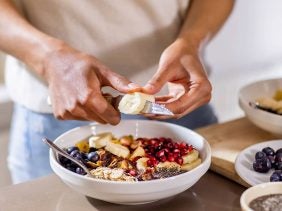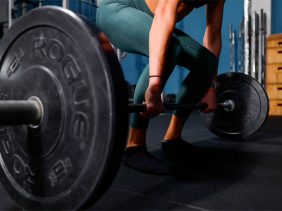Cycle Nutrition : These are The Appropriate Foods for Each Phase of Your Cycle
 ©westend61
©westend61
Spring, summer, fall, and winter – many people live their lives and adjust their routines according to this cycle, and this no longer includes just the annual seasons. These seasons also describe the four different hormonal phases of the menstrual cycle. With new research, books about hormonal health and food cycling, wellness influencers speaking candidly, and more, discussing the menstrual cycle is becoming less taboo. Learn more about Cycle Syncing and how you can use the phases of your cycle to unlock your superpowers.
You can adapt not only your work, leisure, and physical activity to be in sync with your cycle, but also your diet. Your diet should ideally support your body as its needs naturally fluctuate throughout the month, and even help reduce some discomfort you may feel as a result of a hormonal imbalance.
Cycle nutrition
First of all, there is no solid scientific evidence for cycling your food. Research is still in its infancy, but some dietary adjustments that cycle syncing recommends, like compensating for the loss of iron during menstruation, are logical. In the USA, cycle food is already much better known. Therefore, here in Europe, we can already learn from many testimonials.
People who have adapted their diet to their menstrual cycle report better hormonal balance, which can reduce symptoms of premenstrual syndrome (PMS), excessively painful periods, or mood swings. With regard to PMS and diet, there are some studies that show, for example, that a diet rich in calcium and vitamin D can reduce symptoms.
By supporting your body with the right food and cycling your nutritional plan, you can also have more energy throughout the month.
The healthy basis of cycle nutrition
The basis of the cycle diet is a healthy and mostly plant-based diet. That means a lot of vegetables, fruits, seeds, and grains should end up on your plate. This ensures you a good base of minerals, various vitamins, and phytochemicals. By generally consuming whole grain products rather than white flour and reducing your sugar intake, your blood sugar levels should be kept stable. This is because they are closely related to hormonal fluctuations in the body. In addition, you should make sure you drink enough fluids in every phase of your cycle. Experts recommend avoiding plastic bottles with plasticizers and bisphenol A (BPA), as these are suspected of having a similar effect on the body as hormones. Tap water or calcium-rich mineral water from glass bottles is preferable.
Here’s what you should eat during the different phases
To the base are added different foods in each of the four phases of the cycle, which should support your body optimally.
Ideal foods for winter/menstruation
During menstruation you lose some minerals like iron and zinc. Therefore, it’s useful to replenish the stores. Omega-3 fatty acids and magnesium can help relieve cramps. In general, antioxidants are important during this phase of the cycle. Similar to real winter, warming food and drinks are now the order of the day. So instead of cold muesli or bread in the morning, try having a warming porridge.
Food examples:
- Kidney beans and other legumes
- Spinach
- Pumpkin seeds
- Flaxseed
- Hemp seed
- Olive oil
- Blackberries
- Beet
- Avocado
Try to avoid coffee, alcohol, and unhealthy fats from fast food, because these can aggravate period pain.
Ideal foods for spring/follicular phase
Your hormone levels are now gradually rising again. You feel fitter, more creative, and full of energy. Take advantage of this energy with your nutrition. You can experiment with new recipes or try new foods. Overall, a light diet with lots of fresh vegetables, fruits, and proteins is advised. Phytoestrogens from soy can also support the body now. In addition, probiotic foods, which can contribute to a stable intestinal flora, are recommended. Some people also find it helpful to take in a little more fluid during this phase. A lemon water, for example, is delicious and refreshing here.
Your diet may include:
- Sauerkraut
- Kimchi
- Citrus
- Zucchini, broccoli, tomatoes, peas, etc.
- Legumes
- Fresh herbs
- Tofu
Ideal foods for summer/ovulation phase
When you are ovulating, you can be more outgoing than usual, seem particularly attractive, and are more fertile. Since you are full of energy now anyway, you don’t need a high-calorie or high-carbohydrate diet. Light vegetable dishes, salads, and smoothies are perfect for this time. Protein-rich foods should also be on your menu now. By the way, coffee and alcohol are also fine in moderation during this cycle phase.
Recommended diet:
- Asparagus, Brussels sprouts, cucumber, etc.
- Various salads
- Pseudocereals like quinoa
- Fresh seasonal fruit
Ideal foods for autumn/luteal phase
Your energy level drops a little during the luteal phase. Therefore, high-energy food is just the right thing. Starchy vegetables like sweet potatoes, but also whole grain pasta or brown rice will give you the energy you need. Since some people struggle with PMS during this time, dehydrating foods and foods rich in magnesium and calcium can be useful. Excessive consumption of sugar and salt is unhelpful, as they promote fluid retention in the body.
This can be part of your diet:
- Diuretic teas like nettle
- Fresh herbs
- Whole grain products
- Dried fruits
- Apples and pears
- Sweet potatoes, potatoes, and pumpkin
- Carrots, parsnips, and other high-fiber vegetables
- Cocoa powder (without sugar), cocoa nibs
Cycle nutrition: what else you should know
Taking a closer look at the menstrual cycle allows for consideration of the body’s different phases and its changing needs. Adapting your diet to your cycle can support your body and reduce symptoms of PMS and keep you feeling strong, comfortable, and energized, any time of the month. But not every person and not every cycle is the same. Therefore, some tips can be helpful for some and useless for others. In addition, serious hormonal imbalances can lead to depression and other physical and emotional challenges. If you feel unsure about your cycle or have severe symptoms, you should talk to a gynecologist about it.
More things to know from foodspring:
- Working Out On Your Period: Work with your hormones
- Cortisol: Stop stressing about this hormone!
- Heat things up with these 5 natural aphrodisiac foods
- Is Water Weighing you Down? Learn the Power of Dehydrating your Body
Sources for this article
We at foodspring use only high-quality sources, including peer-reviewed studies, to support the facts within our articles. Read our editorial policy to learn more about how we fact-check and keep our content accurate, reliable, and trustworthy.






















